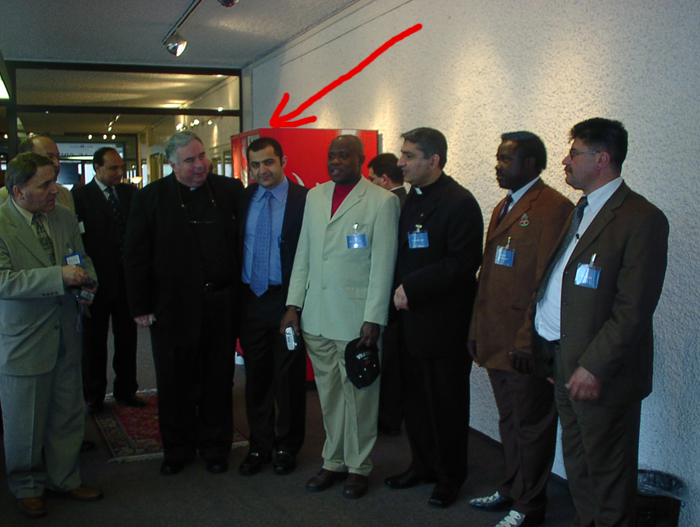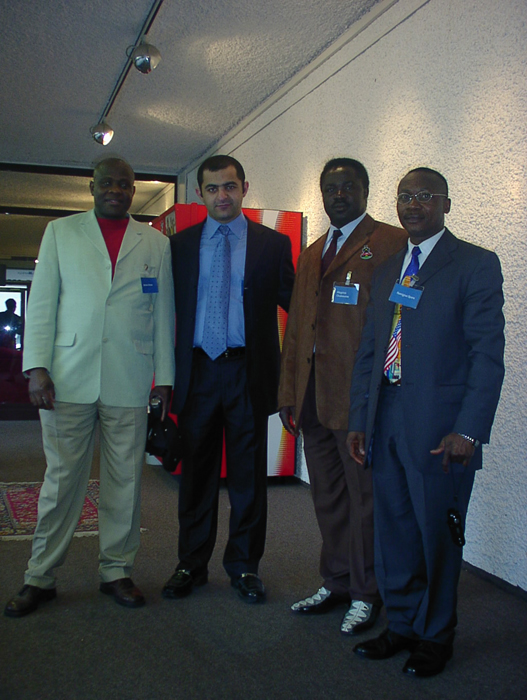|
Genève
Conferece-050417

Roni
from SOMEC with father Keith and other organisations
Coalition
for the defense of
human rights and Christian solidarity international.
Father Keith opens the conference
and start by thanking everybody and he mentions that professor Walid
Phares couldn’t be here but he is thankful that we have his representative
Roni with us.
Keith talks about two main goals
for the coalition witch are, 1. To help our Christian communities in the
Middle East and the second is to work against the
Islamisation of Europe.
Keith talks a bit about the CSI
and some of its accomplishments.
There is a goal for CSI witch is
to build a congress for ¨dhimmy people¨. In the congress there could be
sub groups for writers, artists, politicians and so on.
Later every attended stood up and
presented himself and his organization.
Some of the attended were from
Iraq, Turkey, Syria, Lebanon, Egypt, Sudan, Nigeria, Serbia and
Montenegro, USA, France, UK, Austria, Switzerland and of course from
Sweden:
I was representing Somec
(Solidarity Organization for Middle Eastern Christians) in Sweden and was
there also on behalf of Professor Walid Phares.
Later during the day we had a few
more Copts and Africans.
We continue and some people talk
about the situation under Islamic rule in general.
We then divides in three groups
were we worked for an hour on different angles of the subject. I choose
the group of Media and Academics.
It was a good talk and I pointed
out the importance to work on the European Academician.
Those are the people that will be
working on the Middle East and with Islamic issues later on and if they
have an education that tells them something it is very hard to later take
that away from their heads and convince them to see things our way. I
mentioned my University Uppsala and how the situation is in Sweden and
that we have opened a door to students here to study at a private
Christian University in Lebanon were students can get another view of the
Middle East than students that end up in Cairo or Damascus.
They all agreed of course and the
next day when we were at the UN building we met a girl that was studying
Islamic studies in Geneva University and she had the same view on things
like my fellow students in Sweden. Later she asked some questions to the
different speech holders and she had exactly the same questions Im used to
hear in Sweden.
Conference at the UN house
05-04-18
Victims of Jihad
|

Roni from SOMEC with other organisations |
Johannes Jannes, professor of
Islamic studies in Holland
He talked about takfiir and
refered a lot to Ibn Taymiya.
He talked about the Wahabi
movement and that they would spin on the takfiir to include the whole
society. He talked about Sayed Qoutb and his movement later on.
Hammouda Bella, Northern Sudanese
Human rights activist
He talked about Sudan’s situation
and how the bad part of the Jihad ideology came in to Sudan through Egypt,
first through Hassan Turabi and his followers who were trained by
Hezbollah in Lebanon. There were a fatwa in Sudan from 1993 that says that
every one who leaves Islam must burn in hell. Also he mentioned the
houdoud law witch tells you cut hands and stone and so on. He also talked
about the massacres that ¨Arab Sudanese¨ are doing on against other black
Muslims in Darfur region.
David Littman, writer
He talked about Saudi and Egyptian
school books and how they teach that the Arab/Muslim kids are more
superior to anyone else. They also teach that Jews and Christians will
burn in hell and that they are the enemies of Islam.
Bat ye´or, writer and Middle East
expert.
She talked about Dhimmitude people
and the system in general.
She got many questions and
answered very well. Some mentioned that in Andalusia Arab Muslim rule were
very good with other religions and Bat answered that Andalusia were full
of Christian slaves and how the Jihadists could come twice a year and
demolish towns and villages. She declared that the Golden age of Andalusia
were only a myth were there were a certain good relation between artists
and other groups but certainly not on the human rights basis. Jews and
Christians were all gone by the 1200 century.
Simon Deng, southern Sudanese and
former slave in a so called Arab Sudanese family.
He talked about all the massacres
made on the southern Sudanese and there were over 2 million dead only
between 1083 and 2005. Their only crime is that they refuse to Islamise
and become Arabs. Manu Islamic and Arab countries sponsor the northern
Sudanese to do what they are doing while no country officially support the
south Sudanese’s cause.
When he were talking he talked
about his time as a slave in that Arab/Muslim family and while talking he
started to cry a bit and couldn’t continue his speech. He had to leave the
room and let someone else continue his testimony.
It was very sensitive and I can’t
explain the feeling in the room.
Ayaan Hirsi Ali, member in the
Dutch parliament, of Somali origin.
She was the one behind the
documentary about the role of women in Islam when the Jihad fundamentalism
is leading. She tried to not accuse Islam as whole and said that not all
Muslims do the things she find wrong but that that were a part of Islam
and many girls and women do suffer under it, even in Europe.
Caroline Fourest, French writer
and ¨feminist¨.
She has write about Christian
extremism in 10 years without any threatened and about Muslim extremism
for 5 years with some threat. She said that the women issue is something
that unites all extremists in all religions.
Muslim thinks sometimes that they
are stopping the influence of the west by not giving women her full
rights.
Azam Kamguian, Iranian writer who
have left Islam.
She also talked about the
difficulty of leaving Islam and what could happen to women if they do
that. She described a bit the situation for women in today’s Iran.
Bin Warraq, Pakistani historian
and writer that have left Islam.
He talks about the danger that
anyone that leave Islam can face. He refers to many verses from the hadith.
Edward Said´s book ¨Orientalism¨ has made lots of damages and today we are
changing that vocabulary to something we call ¨Islamofobia¨.
The two conferences were both
excellent and very educative. It was a great opportunity to share the
problem the Middle East is struggling with since ages ago with other
people and nations struggling now and others who their struggle is about
to begin. I hope we can keep the uniting efforts to be able to stand up
against the same danger that is threatening our human values and our
existence as free human beings. |